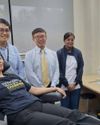
With Singapore’s workforce clocking in an average of 44.9 hours of work in a week, the city’s companies are implementing tailored wellness programmes to combat insufficient sleep, stress and potential burnout.
At risk management and advisory firm Willis Towers Watson, employees are able to take a break in their wellness room for a short massage or power nap in between work. “We encourage work-life integration by allowing colleagues the ability to work from home when required. We also organise in-house badminton matches, weekly pop-pilates, yoga and Zumba classes in the office for colleagues to participate after work,” Pheona Chua, senior consultant for corporate health & wellbeing at Willis Towers Watson Asia, told Singapore Business Review.
“Many large firms also provide employee assistance programmes to support employees with all-rounded mental wellbeing initiatives. Mid and smaller firms typically organise lunch-and-learn sessions and a series of support group workshops that are highly effective in smaller groups,” she said. “When we consider programmes to an individual’s needs, they typically respond with higher level of engagements which boost productivity level. This leads to a reduction in absenteeism and turnover rates.”
According to a survey conducted by Willis Towers Watson in 2018, firms with effective and tailored health and wellbeing programmes in place are two times more likely to outperform their peers, 50% more likely than competitors to report lower turnover rates, and are seeing fewer days of unplanned absences per year.
この記事は Singapore Business Review の October - December 2019 版に掲載されています。
7 日間の Magzter GOLD 無料トライアルを開始して、何千もの厳選されたプレミアム ストーリー、9,000 以上の雑誌や新聞にアクセスしてください。
すでに購読者です ? サインイン
この記事は Singapore Business Review の October - December 2019 版に掲載されています。
7 日間の Magzter GOLD 無料トライアルを開始して、何千もの厳選されたプレミアム ストーリー、9,000 以上の雑誌や新聞にアクセスしてください。
すでに購読者です? サインイン

Smile API Eases Loan Process
Financial institutions and lenders rely on credit worthiness to grant loans, but assessing it can be challenging with only employment and payroll information. Smile API addresses this challenge by transforming employment data into credit data.

Industry Concerns Rise As Accountant Numbers Decline
Accounting firms and universities strive to boost the sector's appeal with new roles and education programmes.

New Rule Curbs Biases Against Flexi Work
Employers who oppose remote work solely because it deviates from traditional office norms can no longer deny this option to employees and may face consequences for doing so.

Trials Target Better Management Of Treatment-Resistant Depression
Managing treatment-resistant depression (TRD) can take months to years, but Singapore is accelerating the process by embarking on trials of personalised transcranial magnetic stimulation (TMS) specifically tailored for Asian brains.

Singapore's tech powerhouses triumph at SBR Technology Excellence Awards 2024
In today's digital age, technological innovation is not just a competitive advantage; it is a key driver of progress. Companies that embrace digital disruption and leverage the power of technology are unlocking a world of opportunity, transforming industries, and shaping a more connected future.

InterContinental unveils rain refund package for guests
Guests receive a refund for a 1-night room rate if it rains for more than 2 hours during their stay.

New law weaves in work protections and retirement benefits into gig workers' safety net
Platform workers will be able to make CPF contributions into their ordinary and special accounts.

Surbana Jurong's new HQ integrates green spaces and smart technology
The headquarters features biophilic elements that enhance natural light and air circulation.

ION Orchard dives into gamification amidst experiential retail demand
The mall's in-app augmented reality game offers more than 30 rewards.

Why Singaporeans are okay with locking away over $4b of their money
Customers can only access locked’ money with a physical card or by visiting a branch.